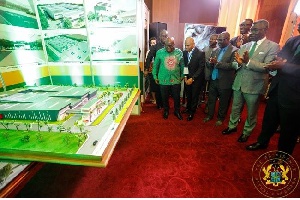 President Akufo-Addo examining the prototype of the recycling facility
President Akufo-Addo examining the prototype of the recycling facility
The President has revealed that the construction of an integrated e-waste recycling facility, at Agbogbloshie, a suburb of Accra, will commence in October this year.
Speaking at the launch of national integrated e-waste management programme, on Wednesday, President Akufo-Addo noted that the down-side of the ICT revolution has meant the production of high volumes of electrical and electronic waste.
With an estimated 40 to 50 million tons of e-waste generated annually, and with Ghana serving as the final destination for e-waste, the President noted that e-waste is a major global problem, and one of the top environmental challenges of the 21st century.
Used electronic and electrical equipment imported into the country continues to be the major source of electronic waste, as many have not been tested for functionality, and in contravention of regional and international laws, such as the Bamako Convention, the Basel Convention, and EU e-waste shipment regulations.
President Akufo-Addo noted that with Near End-of-Life used equipment not covered by existing international or regional conventions. Government has passed the Hazardous and Electronic Waste Control and Management Act, Act 917 (2016).
The Act, the President explained, marks the initiation of two key provisions of Act 917, which are critical to the successful implementation of this new Law.
“First is the designation of the external service provider, i.e. SGS, to verify, assess and collect the Advance Recycle Eco Fee on all electrical and electronic equipment, under the Fifth Schedule of Act 917, imported from all exporting countries. Second is the establishment of a state-of-the-art recycling facility to be constructed at Agbogbloshie, in fulfilment of section 31 of Act 917,” he said.
President Akufo-Addo assured that the recycling facility will not be a stand-alone entity, as there is a component of the project that will support the establishment of a network of collection centres to provide a continuous supply of raw material to sustain the operations of the facility.
This component, he said, will create over 22,000 self-sustaining jobs for the Ghanaian youth.
President Akufo-Addo was confident that “we are about to see an end to this global environmental challenge in Ghana, that is fast becoming a national security threat to most governments on the continent.”
One important aspect of the Act, the President highlighted, is the establishment of a fund to support key trade associations, such as the Ghana Union of Traders’ Association (GUTA), the Association of Ghana Industries (AGI), and the Media, and to support research in academic and research institutions.
“The Fund will offer incentives for collection, transportation and disposal of electrical waste, and promote public education on the safe disposal of electrical and electronic waste and negative effects of electronic waste,” he said.
He urged all agencies involved in the project to co-operate and develop a strategic business plan which will put the e-waste fund into productive use for the benefit of all.
“I encourage members of the various scrap dealers’ associations, across the country, also to take full advantage of this programme. I appeal to them to halt the burning of electrical and electronic wastes, as it only pollutes our environment and the quality of air we breathe. They have an opportunity, through this programme, to expand their scrap collection ventures into big businesses,” President Akufo-Addo stressed.
“So, from October 1, 2018, the operationalisation of Act 917 will begin with the collection of the Advance Recycling Eco Fee on all electrical and electronic items from all exporting countries. Construction of the integrated e-waste recycling facility will also commence in October this year,” President Akufo-Addo added.